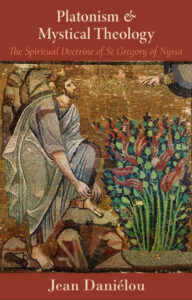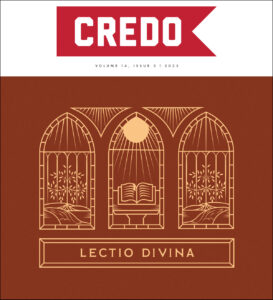I f there are two things that can make classically reformed Evangelicals shift in their seats it is Platonism and Mysticism (especially if they are Southern Baptists). I do not mean to make light of those who do so, as these subjects can feel odd at first. The work under review, however, may help with these uneasy feelings. This work is a ressourcement, a retrieval of that which has largely been lost in the modern church. In this book, Danielou carefully dissects some of the philosophical categories taught by Gregory. In short, the intersection of Platonism and the mystical faith is a call to go beyond the physical world before us and to lean into the spiritual realm of the Christian faith. The Earth, skies, and planets do not just exist for their own sake but are to be a window into the Heavens.
f there are two things that can make classically reformed Evangelicals shift in their seats it is Platonism and Mysticism (especially if they are Southern Baptists). I do not mean to make light of those who do so, as these subjects can feel odd at first. The work under review, however, may help with these uneasy feelings. This work is a ressourcement, a retrieval of that which has largely been lost in the modern church. In this book, Danielou carefully dissects some of the philosophical categories taught by Gregory. In short, the intersection of Platonism and the mystical faith is a call to go beyond the physical world before us and to lean into the spiritual realm of the Christian faith. The Earth, skies, and planets do not just exist for their own sake but are to be a window into the Heavens.
A short history of Gregory of Nyssa and Jean Danielou are both worth noting. First, Gregory of Nyssa – born in 335 in Cappadocia of Asia Minor (now in Turkey), Gregory grew up under the influence of his elder brother, Basil of Caesarea, and their friend, Gregory of Nazianzus. Gregory of Nyssa wrote The Life of Moses, Catechetical Discourse, and Virginity. Jean Danielou, born in 1905, studied under Henri de Lubac and was ordained as a Catholic priest in 1938. Danielou served in the French Air Force and specialized his research in the writing and work of Gregory of Nyssa. This book is the revised, published, and translated dissertation of Danielou.
Danielou structures his work according to the three stages of Orthodox Spirituality. While many regard the three as purification, illumination, and then deification, Danielou, using the language of Gregory, refers to them as Light, Cloud, and Darkness. These three terms used by Gregory (and Danielou) do not stand in opposition of the Orthodox understanding, but instead provide further information regarding how we might understand the traditional stages. Light involves the awakening of the spiritual life of the believer and the recognition of the need for spiritual practice. Cloud involves contemplation and dispassion. Finally, darkness, in relation to the story of Moses on Sinai, is about “the seeing without seeing.”[1] Danielou helpfully states that darkness is a “supernatural mode of knowing, whose principle is the Spirit, and which is inaccessible ‘to other persons.’”[2]
In part one Danielou parses out Greogry’s understanding of the body and dispassion. In the process of being illumined we must be purified. The body must put off its animalistic tendencies and passions and seek that which is above. In doing so man can start to gain now what awaits them later. Second, Danielou deals with contemplation. When one is purified,a their mind is able to understand the world as a grand sign of the work of the Lord that can lead them spiritually to the Heavens. It is then, in being wrapped up in the glory of the Lord and the practice of the virtues, that the believer is in a more intense spiritual communion with the Lord. The spiritual senses are awoken, the physical going past itself into the spiritual, and the life of the believer being wrapped up in participation in God and union with Christ. In such they live in ecstatic love, consumed fully with a desire for Christ, and nothing else.
Critique
The critical concern is not on the writing of Danielou, per se, but more so the direct platonic thought that Gregory seems to hold (this, however, could be a slightly skewed understanding due to the writing of Danielou). Gregory makes it clear that in order for someone to “ascend the ladder back to their intended state” they must remain an unmarried virgin.[3] This argument made by Nyssa, and ultimately Danielou, is grounded not only in Platonic thought but biblical argumentation (Mark 12:25 and Matthew 22:30). It is important to note that Gregory does not make singleness/virginity a requirement for salvation but for the more proper ascent upward towards our truer self.[4]
Critical Appropriation
With a platonic background Gregory’s account holds that the body is foreign to man. Danielou writes, “Thus, mortality, sexuality and biological life as a whole are alien to man’s true nature.”[5] Danielou does not do a great job at parsing this out. The author re-defines “garments of skin” as “all that we have in common with animals.”[6] This category falls under the critically appropriated category because of the lack of clarity in the language. It would be easy to misread Danielou and Gregory. It could seem as though they both advocate for a view where the body as a whole is not part of what it means to be human. In reality, however, Danielou is advocated for a shedding of sin.
When Gregory moves through his teaching, he makes clear that the “garments of flesh” are the things in relation to animals (sleep, nutrition, generation, etc.). These are things that we will not need in eternity. All in all Danielou devotes a sub portion of a chapter to this idea. There he works through Gregory’s teaching about human rationality and how rejection of wisdom leads to animalistic tendencies. This portion of the chapter should be fully accepted but would, admittedly, benefit from careful nuance and clarifying points.
Another area of careful reading and critical appropriation comes by the advocating of asceticism. The term in, and of, itself bears a lot of weight, so it must be understood correctly. What is not called for in ascetic life is a retreat alone, as if a sojourn to the mountains or desert was the ultimate goal. What is called for is the removal of sins and putting off of worldliness. This is essential for Gregory to continue in the lifelong illumination of the Christian life. The ascetic life is what aids the Christian in conformity to God and the development of the Spiritual palate.
Appreciation
What Gregory, and in turn Danielou, present is a full integration of appreciation of the spiritual world around us. They both, whether or not plainly stated, read the statement, “Creator of Heaven and Earth” seriously. God is not just the creator of the physical realm but the spiritual one. In turn, they know that the believer, being body and soul, should surpass that which is around them and their five physical senses, always moving towards the spiritual realm. They know that by salvation in Christ, and a life with the indwelling spirit, they are participating in the very life of Christ and in God himself. Gregory says “the goal of the life of virtue for human beings…is likeness to the Divine, and for the sake of this good both the soul’s purity and its separation from any dispassionate disposition are in virtuous persons carefully realized, so that a certain impress of the transcendent nature comes to them also.”[7]
Conclusion
Reading Gregory requires a keen sense of his context and purpose of writing. Danielou is an equally tough read, but ressourcement (and the reading of it) it is a worthy endeavor. It is an enjoyable read that pushes the believer to develop their senses for the divine. By salvation the believer can be purified. And in the purification of the heart, mind, and soul the greater spiritual reality can set in for the believer. In doing so the reader is led past themselves and to the throne of God. It is in this that “knowledge becomes love.” This work does not happen simply but requires that, “one must always, by looking at what he can see, rekindle his desire to see more.”[8] In doing such, passion would grow and there will always be an ascent to see God. For what is it worth for a man to gain the world and lose his soul; instead set your mind on things above. This is the great call of Danielou and Gregory of Nyssa.
Endnotes
[1] Vit. Moys, 2.162-163 (PG 44:376D-377A; Malherbe, 94-95).
[2] 224, Bas. ( PG 46:812C; McCambley, 22).
[3] Gregory of Nyssa, Virg. 12 (pf46:376A; FC 58:46).
[4] 47-48.
[5] 52.
[6] Ibid.
[7] Canto 9 (pg 44:961A-C; Norris 287).
[8] De Anima Et Resurrection GNO3/III:71.2 and Vit Moys. 2.238-239 (Malherbe, 116).


